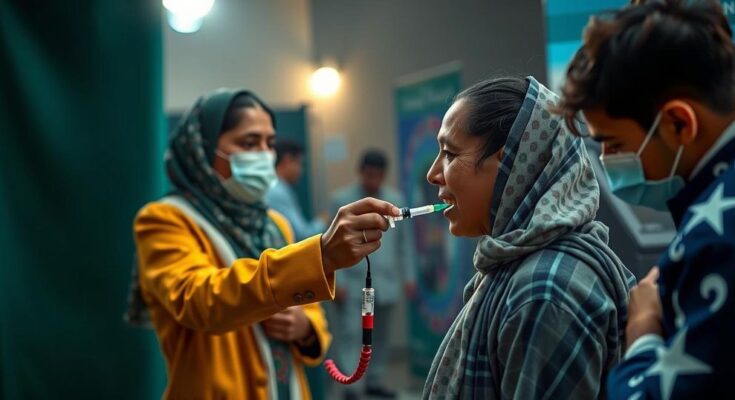Pakistan and Afghanistan have launched new polio vaccination campaigns amidst a resurgence in cases, reporting 64 total infections this year. Pakistan’s initiative involves 400,000 health workers targeting over 45 million children, while Afghanistan aims to vaccinate 6.2 million children in 16 provinces. Concerns over vaccine hesitancy, security challenges for health workers, and the need for targeted outreach are paramount in efforts to control and eradicate polio.
On Monday, Pakistan and Afghanistan initiated new polio vaccination campaigns in response to a worrying increase in cases of the disease. As the last two nations worldwide where polio remains endemic, both countries are mobilizing efforts to protect children against paralysis caused by the virus. The World Health Organization (WHO) reported a rise in polio infections, noting a total of 64 cases this year—41 from Pakistan and 23 from Afghanistan—compared to only six cases each in both nations last year. In Pakistan, the government launched a weeklong nationwide vaccination campaign that involves the deployment of 400,000 health workers tasked with vaccinating over 45 million children under the age of five. Ayesha Raza Farooq, the Prime Minister’s Special Assistant for polio eradication, remarked that this is the third nationwide effort this year prompted by the significant uptick in polio cases across 71 districts. A substantial portion of the infections, more than half, are reported in the Balochistan province, which borders Afghanistan. Anwarul Haq, the coordinator of the National Emergency Operations Center for Polio Eradication in Pakistan, emphasized the need for parental cooperation in this dangerous landscape, stating, “With the threat at an all-time high, we must act as one nation to keep our children safe through vaccination.” The resurgence of poliovirus in Pakistan has been attributed in part to vaccine hesitancy in rural areas, driven by misinformation suggesting that vaccination efforts serve as a Western conspiracy against Muslim children. Furthermore, violence against health workers in districts close to Afghanistan has hindered their initiatives, leading to the tragic loss of numerous vaccinators and law enforcement personnel this year. In Afghanistan, health officials announced a three-day polio vaccination campaign targeting approximately 6.2 million children under five across 16 provinces, primarily near the Pakistan border. This initiative commenced following delays due to the Taliban’s decision to suspend house-to-house vaccine deliveries in Kandahar, with an emphasis on localized vaccinations at mosques instead. An independent monitoring board indicated that the Taliban’s actions stemmed from concerns regarding surveillance activities as their leadership resides in Kandahar. World Health Organization officials have highlighted the necessity of integrating migrant populations into vaccination programs in Afghanistan and addressing refusals for vaccination. They stress that establishing a dedicated female public health workforce is crucial for overcoming various barriers to polio eradication efforts in the impoverished nation.
The ongoing polio vaccination drives in Pakistan and Afghanistan arise amid a resurgence of polio cases, marking an alarming situation in the only two countries where the disease continues to have endemic status. Despite global efforts to eradicate polio, challenges such as misinformation, security threats, and operational limitations pose significant obstacles to successful vaccination campaigns. Both nations have mobilized extensive resources and human capital to counter the rising threats posed by poliovirus, aiming to safeguard the health and future of their children, particularly those under the age of five who are most vulnerable to the disease’s debilitating effects.
In closing, the renewed polio vaccination campaigns launched by Pakistan and Afghanistan are critical responses to the alarming surge in polio cases within both nations. Addressing ongoing challenges such as misinformation, violence against health workers, and the integration of marginalized populations into vaccination efforts will be essential for achieving the goal of eradicating polio. The commitment of health officials and the cooperation of communities will be vital in protecting countless children from the crippling consequences of this preventable disease.
Original Source: www.voanews.com




